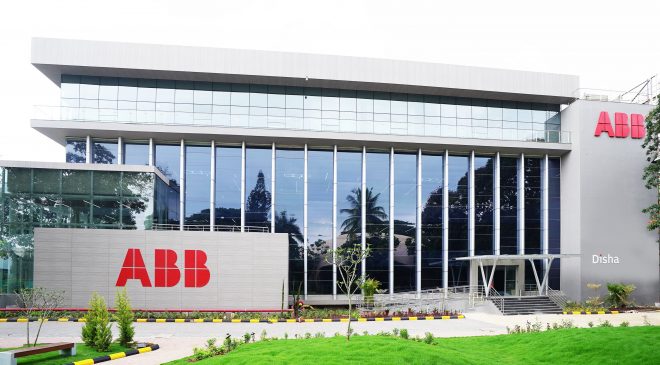
Campus aims to rely on 100 percent renewable energy by 2023.
Engineering multinational company ABB India has moved its corporate and business office to an integrated, sustainable, and digitalized facility within its own Peenya campus in Bangalore.
The facility, named Disha, will house the corporate office, along with the offices of Electrification and Motion businesses alongside Process Automation business in the same campus.
Located in one of the prime industrial areas of Bengaluru, the campus minimises carbon footprint by sourcing 90 percent electricity renewable sources; it reduces 55 percent load on potable water with intelligent fixtures and with 98 percent of its waste recycled, almost reaches its target of zero waste to landfill. The 15 acres campus has a green cover of about 30 percent.
By upcycling and repurposing an existing building to convert it to Disha, the project has optimized resources and significantly reduced the environmental impact which a greenfield project of this scale would have generated. Showcasing ABB’s expertise in digital energy management solutions, more than 5000 ABB products are being used in Disha.
It is the first ABB facility to deploy ABB’s Aspect IBMS (Integrated Building Management Solutions) technology. This is a unified platform to monitor and control from any location or city, the multiple points enabled with hundred sensors from lighting to HVAC solutions, room controls, safety, and security systems with special CO2 monitors for ambient air quality monitoring in the rooms.
This is combined with a cloud-based SaaS solution – ABB Ability Building Ecosystem with Active Energy and Asset Manager. It is complemented by electrical from the ABB portfolio and an AI-enabled vehicle management and parking system. These nearly 500 connected products with embedded intelligence are designed to significantly reduce overall energy consumption and carbon footprint while saving energy costs by up to 30 percent.
“At ABB, we have always taken a sustainable and future-ready approach to business. Sustainability is a key part of our company’s purpose and of the value that we create for our customers, employees, and all our stakeholders. The move to the existing Peenya campus brings our people together under the same roof enhancing collaboration and agility. It is also a step towards minimising our carbon footprint, repurposing existing resources while offering a smarter workplace focused on employee wellbeing and improving productivity. ABB is developing all the companies’ manufacturing campuses at Nashik, Baroda, Faridabad, and Bangalore & multiple office campuses to common ESG standards in India. The vision was to create a model, flexible industrial infrastructure project with an enabling eco-system by working with all our partners and stakeholders,” said Sanjeev Sharma, Country Head and Managing Director, ABB India.
“In India, almost 30 percent of the energy is consumed by buildings, and we believe Disha will create a legacy, a demonstration of what can be done to make buildings more efficient through the deployment of integrated digital building automation & electrical technology,” he added.
This project also included the enhancement of local infrastructure through a 360-degree development of the associated road related infrastructure and laying of cable trenches for future expansion of IT infrastructure of the companies co-located in this area. As part of the sustainable infrastructure development theme, a special recycled plastic mix of 6,000 kgs, equivalent to 1,50,000 (1.5 lac) one-liter bottles is used for the footpath construction.
ABB India’s Peenya campus has been in operation for more than 30 years and has been the bedrock of multiple milestones for the company. The campus hosts innovation centers of multiple products, global factories, precision product manufacturing with smart shop-floors, and remote monitoring centers for connected devices across Indian industries.
The new building, Disha was built continuing the heritage of the location as well as retaining the existing green cover. Nearly 120 trees, some more than 60 years old, were preserved during the construction process.




